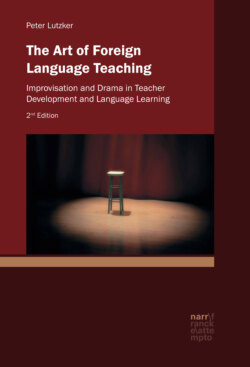Читать книгу The Art of Foreign Language Teaching - Peter Lutzker - Страница 48
На сайте Литреса книга снята с продажи.
4.6 Research Inquiry – ‘Thick Description’
ОглавлениеAfter originally considering the option of formulating a detailed questionnaire, a much more open modus of inquiry was adopted in the form of a letter designed to offer a number of suggestions and ‘impulses’ for the participants. A copy of the standard letter is printed below. (In those courses in which I participated, an almost identical paper without the first line was handed out to the participants at the end.)
Dear _________
I’m writing to you now because according to his records you attended one of Vivian Gladwell’s clowning courses. In the context of my Ph.D. research, I’m trying to assess the possible effects of Vivian’s workshops. (This is, of course, done with Vivian’s blessings.) Thus, I am asking you to please take some time when you can find it and write down anything/everything that you can think of in terms of what you remember of the course, your experiences and feelings back then, in the meantime, and how you view this now. In the context of my work, all the thoughts and feelings you can offer in this regard would be both relevant and very much appreciated. Unless you really prefer to write this in English, I would suggest writing it in German. (This assumes, of course, that your mother tongue is German. If it is not, I would appreciate your replying in English…)
All your answers will, of course, be treated as confidential and all the standard ethical practices of printed research will be followed i.e. names will be changed, background information put in a neutral context etc.
This is not only the first attempt to evaluate this kind of artistic work for language teachers in a scientific context, but the first attempt to my knowledge to evaluate any Waldorf in-service training in this manner. This is clearly long overdue and we would be greatly helped for our future efforts by getting extensive feedback.
It would be very helpful if you started your reflections with the following brief information:
Name:
Years of Experience:
Educational Background (State exams etc.): Waldorf Training:
What subjects:
Years of Teaching
Which grades you have taught:
Afterwards, it’s all yours.
If you prefer to send this as an e-mail attachment, this will be fine.
Best regards,
The choice of this form of open letter was made with the hope and expectation that it would lead to a much greater accumulation of rich ‘thick’ data, than would be elicited from a questionnaire. In contrasting ‘thin’ and ‘thick’ data, Norman Denzin writes,
A thin description simply reports facts, independent of intentions or circumstances. A thick description, in contrast, gives the context of an experience, states the intentions and meanings that organized the experience, and reveals the experience as a process.210
In his classic discussion of the essential requirements intrinsic to all forms of ethnographic research, Clifford Geertz argues for the necessity of generating richly descriptive data which enables the researcher and later the reader to concretely perceive human behaviour.
If ethnography is thick description and ethnographers those who are doing the describing, then the determining question for any given example of it, whether a field journal squib or a Malinoswski-sized monograph, is whether it sorts winks from twitches and real winks from mimicked ones.211
He maintains that a comprehensive and accurate picture of phenomena can best be realized by focusing on its complex specifics:
The aim is to draw large conclusions from small, but very densely textured facts.212
The extensive and varied nature of the participants’ responses in this study ended up providing a rich basis for interpretation.
